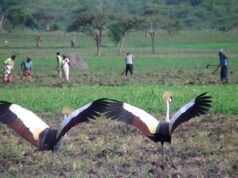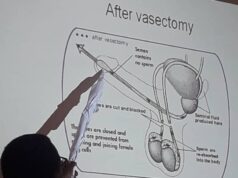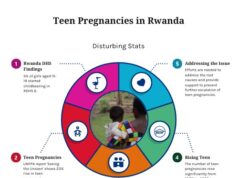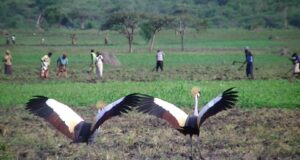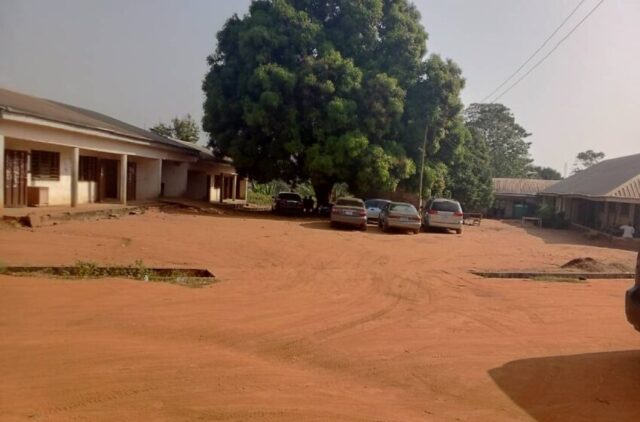
12-year-old Chinecherem* did not know that her life will change automatically that eerie mid-morning, past midnight, on 24th August 2022, when she went outside of her house to answer the call of nature. Raised by a single mum, Chinecherem* lived with the mother and brother in an apartment that has no toilet facilities; hence they practice open defecation. They live in a village that was overrun by insecurity currently bedevilling the southeast of Nigeria. In this village, there are no state actors and cultists, that maim, kidnap and rape women and girls at will. They boast in broad daylight of their conquests; they also masquerade themselves as a deadly cult that has ‘defied authorities’.
According to the mother, Madam Theresa*, “ no one talks to the commander and he does what he pleases”. For Chinecherem*, that night was just like any other as she came out to answer the call of nature, unbeknownst to her danger was lurking in the shadows of the night which will alter the course of her life forever. Before she realized it, she was abducted by five machete-wielding men in their 30s, they tied her mouth, and when she tried to struggle, they stabbed her with a dagger on her leg and forcefully carried her to an uncompleted building. When they got to the place, four of them kept waiting, while one of them went to get, what Chinecherem* described as “cocaine”, locally called “mkpulu mmili”, and after getting high on it, they took turns to rape and violate her one after the other. According to her, this ordeal was on till just a few moments before the actual day break before she was pushed out and allowed to go home in that state. When the mother raised the alarm that her daughter was violated, the commander of the cult came to her house to threaten her life, they used the head of the gun on the brother when he questioned why they violated the sister, the traditional ruler of the village was threatened with his family and he had to leave the village for the sake of his life; According to Chinecherem* she was abducted a second time in broad daylight and taken to the cultist’s den as a punishment for opening up to her mother, but she was later released unharmed. Hence, with theflood of 2022 which submerged some communities in the Anambra riverine areas, the community was submerged, so Chinecherem* and the mother ran for safety.
Just like every other day, Nkechi* an 18-year-old secondary school leaver in a village in Anambra had gone to buy fuel to power the generator for her parents. Power outage is a peculiar occurrence in the village, and households who are poor end up using lamps popularly called “mpanaka”, but the average ones use the generator.
Nkechi* had lost her phone before this time and needed a new phone, at an affordable rate. Hence Obinna offered to help her buy a new phone from his phone shop. Obinna* claimed to be a married man with children who had no time for girls and pretended that he was helping Nkechi* replace her lost phone. On the other hand is Ndubuisi*, who had always wanted to have a relationship with Nkechi* but she turned him down because she did not want to have a relationship with him. On 18th January 2022, Nkechi had gone out to buy fuel when she met Obinna*, who deceived her and told her that he had bought the phone, but the phone was kept in an uncompleted building, all she needed to do was to come and pick the phone. Without suspecting any foul play, Nkechi* followed Obinna* into the uncompleted building to pick up the phone, before she knew what was happening, she was drugged and raped by the duo of Obinna* and Ndubuisi*. She was also framed and threatened to be silent. When she got home that day, she did not tell the mother about it, hence there was no intervention until she started having signs of pregnancy; lo and behold she found out that she was pregnant. She kept the pregnancy and currently has a three-month-old baby (as of the time of interviewing her).
24 years old Ifechiaghanam*, a student at one of the universities in Anambra State thought that she had met her knight in shining armour. She met Alfred* and in barely one month he had proposed marriage. Hence on the 17th of September 2022 Alfred* called Ifechi* up and invited her to come and meet the grandmother. Without any form of suspicion, Ifechi* agreed and he lured her to his house, and before she could understand what was happening, he had turned violent towards her. According to Ifechi*, Alfred* stood up and locked the door, and before she could even say anything he slapped the living daylight out of her. In her words, “I struggled for my life as he kept slapping and beating me, dragged me and he forcefully removed my clothes. At some point, he had to use his hands to strangle my neck and I was almost gasping for air and out of breath for some time. He overpowered me, I was already weak, he then violated and raped me, and while doing that he kept beating me and slapping me”. When I inquired further, Ifechi* said that there was pressure on her to get married, as her mother and aunty will always remind her of the need to get married as soon as possible. In the course of the actions taken, Ifechi* confirmed that she had gone to report at the Ministry of women affairs Anambra State and that she was referred to the Sexual Assault Referral Centre (SARC). She has also gone through medical tests and two sessions of counselling.
Intervention by GBV groups
The story of Chinecherem*, Ifechi* and Nkechi* are part of the gory violent stories of rape, some of which are not even reported at all as a matter of stigma. Rule of Law and Anti-Corruption (RoLAC) in partnership with NTASI, Sexual Assault Referral Centre Anambra state, launched in September 2019 so far has over 300 recorded rape cases without any form of judgment on any of them, according to available records. The Integrated anti-human trafficking and community development initiative (INTACOM Africa) run by Hope Okoye, who specialized in Gender Based Violence and was founded in 2009, noted that the organization has been intervening and responding to issues of trafficking of women, girls and child abuses. As the team lead of Sexual and Gender-Based Violence with the support of ROLAC, the last analysis has recorded over 350 cases of rape in Anambra state. Between 20th July and November 2022, they have arraigned 49 cases at the SGBV specialized Magistrate court set up by the Anambra state government. Indeed, there is no judgment so far as some cases will be charged to the High court, hence they are ongoing cases.
On the reason for the delayed judgment, Hope Okoye who also doubles as the Special Assistant to the commissioner of the Ministry of Women and children affairs on sexual and gender-based violence, explained that there are technicalities and evidence that need to be secured, like traceable to the blood, forceful sexual intercourse like bruises, blood stains, tearing of pants, that the survivor is not supposed to bathe, but go straight to the general hospital, clothes kept without being washed, the medical doctor should see it and reports be made within 24 to 48hours of the incident occurrence. She also said that the delay from the justice department and the longer duration of cases make people lose interest in rape cases. The cases are always handled at the High court, and the entire process of getting the cases filed, lack of money for prosecution, and lots of money are needed for logistics, though the issue of stigmatization is being handled by the counsellors who encourage survivors to tell their stories. On the way forward she said that there should be the designation of special courts that handles only issues of GBV, as it helps with the data, is cost-effective, and has territorial jurisdiction all over the case. Constantly frequenting the court makes the survivors to be demoralized. In the case of Chinecherem*, she explained that it is a high-profile case with a security undertone being handled by the Anambra state government in conjunction with the State Police to ensure that the culprits are arrested and prosecuted, but in the interim, she is undergoing counselling and therapy, and now in the custody of the state.
Delay of Judgment on Rape cases in Anambra state
Ugochi Freeman whose organization is currently handling a case of rape of 5 year old raped by a man of over 40 years noted that the Creative mind centre for youth and community development does intervention for GBV most especially for minors and sometimes for adults. According to her, her organization has handled 8 cases, which are currently ongoing at the moment. “Some did not go to court as a result of frustration. Transfer of the cases from the local government to the state CID, then to court, while the perpetrators when arrested are remanded in the prison. The state will then assign a lawyer that will take up the case”.
The organization also takes the survivors to the hospital to ensure that there was a violation and offers free medication and counselling. She also collaborates with the Davina care foundation and most times these survivors are from a poor background. On the cause of delayed judgment, she enumerated a lack of money to pursue the case, but that they work with Legal aid to seek advice on the best way possible to handle cases and bring justice to the survivors. Sometimes, the survivors opt for Settlement which is getting the offender to part with some money like 500,000 or one million Naira as an Alternative Dispute resolution. These survivors or family members in particular women whose child was raped opt for an out-of-court settlement, while at other times, culprits get their lawyers to defend themselves, and this elongates the process of getting justice. Another cause of delay is from the community where these crimes were perpetrated as the survivors’ families receive threats not to report but push for an out-of-court settlement. They usually receive threats that they will be stigmatized in the village or community if they continue with the cases.
According to Davina Care Foundation founder Rachael Yohannah, she started in 2014 as a charity organization and went into gender-based issues, the foundation has 10 cases ongoing in court at the moment. She noted that before now, handling cases of rape was worse and that society was not accommodating, however, with the sensitization, there is a visible mind shift and there is a reduction in the stigmatization. She also noted that the sensitization made survivors know that there is a place they can run to for help and intervention. In her words, “We don’t get speed; the procedure is too difficult for the families, especially when the cases keep getting adjourned in the law courts. For example, in Lagos state, they pass judgment within a space of one year, but here they keep delaying and moving the court appearances. There should be a human face to the cases of rape, some lawyers defend culprits, because they know that the system will put in place claws that will hinder judgment”. She continued by saying that the Nigerian legal system is not helping out and insisted that If people are not convicted steadily, that the culprits will not stop. “At some point, the victims stop coming to court, and the court strikes out the case after 150 days. Cases of rape and defilement of children should not be delayed. Pro bono lawyers need money. I am currently handling a case and the woman just sent me a heartbreaking message, and I just wish she could have seen the challenges we are facing in trying to get these cases moving. The government should make any case that has to be with defilement free, there should be speedy judgment and the news spread in the village so that people can hear about it and know that there will be very serious consequences for culprits”.
Call to action…
According to Barr Lauretta Ikwuka, Head of the Litigation Committee and a member of the International Federation of Women Lawyers, FIDA in conjunction with Anambra state Ministry of women and children affairs, the Magistrate remanded some of the culprits in prison, and information has been filled in the High court. She also noted that the present government of Governor Soludo set up Children, Sexual Gender Based Violent Court, at Chief Magistrate Amawbia, which sits every Tuesday/Wednesday, to ensure speedy dispensation of justice. She explained further that Cases are moving and no longer adjourned. She also said that most survivors come from very poor backgrounds and do not have money, hence they offer Pro bono services. On how they are funded she said that they depend on donor agencies and individuals to help facilitate the cases. They also source funds to ensure that the lawyers file the necessary papers needed to fast-track the court processes.
Barr Nkoli Ebede, legal practitioner, human right activist, Legal Aid, 50/50 action women (WACOL) on her part noted that when a person is arrested and remanded, that justice has already started. She emphasized that there could be a delay in judgment, but it does not mean that there will be no judgment on the cases. According to her, most survivors of rape are vulnerable and poor. She alleged that sometimes, the law enforcement agents will suggest to the family of the survivor for an out-of-court settlement, and because they are from poor family backgrounds, some of these survivors will opt for a monetary settlement, and this is a huge challenge. In her words, “When you don’t have the witness at the court for prosecution, will you defend and prosecute an empty court? She also believes that with the special SGBV court, there will be speedy hearings of cases, as the preliminaries are done in the magistrate court, and then they are transmitted to the High court. Hence, in a few months, there will be an actual judgment of some of the ongoing cases. She also hopes that there will be another specialized SGBV court at the High court level which, according to her, will make for speedy judgment.
Barr Francis Chimeremeze, member of the Anambra state child rights implementation committee, and member of the violence against person prohibition law committee noted that the biggest claws in the wheel of justice for survivors of rape is the issue of few courts; according to him, “courts are inundated with lots of cases. A judge has been assigned to hear issues on SGBV and lawyers appear in court based on their appearance schedules. Again there is no time limit for rape cases hence some of these lawyers and judges have no time limit. Another point is poverty, as most of the survivors are from very poor families, as they go behind to collect money from the perpetrators and will not avail themselves to prosecute the cases. He also said that Defense Lawyers delay the cases, the more the matter is delayed, then the person standing trial enjoys freedom. He is positive that now that there is a special court attending to SGBV, those people working in the court should be well trained. He also noted that generally in the Nigeria judicial system, cases delay not just rape cases. On how the survivors can access Pro Bono cases, he explained that “There are pro bono services for indigent people, based on the economy, the lawyers will charge. But there is Legal Aid in existence, and faith organizations where lawyers offer these cases for free, NGOs also have lawyers that work and will assist the survivors who may not have money to pay for services of a lawyer”. On reasons why some survivors may opt for a monetary settlement, some of the defence lawyers with the perpetrators end up convincing them that they may never get justice that they should take money than waste their time, and also in the interest of the child/survivor take the money and take care of the family or the survivor in person.
Vapp law in Anambra state…
In 2015, the Federal Government signed the gender-neutral Violence Against Persons (Prohibition) Act, (VAPP) 2015 into law. But Section 27 of the VAPP Act limits its application to the Federal Capital Territory High Court. Therefore, each state must domesticate the Act before it becomes operational. In 2017, the Governor of Anambra State, Willie Obiano, signed the (VAPP) Act into law, making the state one of the few Nigerian states to domesticate the Act. The VAPP law (of Anambra State), 2017 confers jurisdiction on the Magistrate and State High Courts. Section 3 of the VAPP law expands the criminal jurisprudence of rape. Under the VAPP law, males and females can be victims as well as perpetrators of rape. Also, rape victims are entitled to compensation in Section 3.
Edo state as a model state…
Rape cases in Edo state are underreported, just like all over the world. The sexual Assault Referral Center launched in 2020 in Edo state so far has convicted over 70 cases with the offenders serving their judgments. From 1st April till October 2022, there are 97 reported cases while there are 571 cases reported from 1st June 2020 till November 2022 (as of the time of publishing this report). According to Dr Georgina Eromosele who heads SARC, Edo state, she said that “there are lots of cases in court, and once the person is convicted, the person’s name enters the Sexual offender’s register.
She maintained that to have speedy judgment, “one will start from the case itself, it has to be reported early enough. In our organization, we work as a team and we have medical, legal, police, counselling, departments all represented, and it makes it easier for the synergy of workers and the fact that lots of people can report directly to ensure that a case is pursued to a logical conclusion. She also noted that there are designated courts, High Court 1, 2, and 3, which aids to give an expedited hearing to any cases of rape. She also reiterated that there is a timeline for cases of rape, which is within 6 months, to ensure speedy dispensation of justice as according to her, prolonging the cases will lead to a loss of interest in the survivors. On the high cost of the cases, she explained that in cases of rape that the survivors should not be made to pay any money because; hence no costs at all to the victims the government of Edo state takes care of the cost implication. In her words, “when it is children, they are retrieved from the parents… to avoid thwarting the evidence. We also have dedicated hands and people committed to the job. “The wife of the governor of Edo state sometimes joins for the court sessions, and we have meetings every three months to ensure that every arm of the organization gets their jobs done on any case of rape. We work with lots of NGOs, and ROLAC, and there is no granting of bail. What we are working on now is to ensure that people do not abuse the existing structure. In Edo State now, people know that any offender or culprit of rape is in for a long journey with us, hence people are cautious about being arrested for rape. Someone cannot be accused of raping someone and, we allow that person to sleep at home in Edo state. She also noted that they modelled after existing centres, like the Mirabel centre and that the heads of the teams are held accountable with all seriousness. To help survivors get justice the organization needs to work with people who are passionate and appalled by the crime rape. On the VAPP law in Edo state, the process of domestication started in 2019 but was fully domesticated in 2021.
Way forward…
For Barr Francis Chimeremeze, any family that is serious about prosecuting a rape case, should as a matter of obligation follow it to a logical conclusion. He also decried the fact that society itself has not seen rape offence as a serious case that needs to be handled as an emergency. The attitude of society needs to change and create awareness so that citizens will understand that rape is a crime against humanity and that the trauma lasts for a long time. The offenders need to be punished severely to deter others from doing it in the future. There is a need to punish offenders, and the government and its institutions need to have the will to punish offenders. Again, it is important to checkmate the workers of the government institutions to avoid extortion of the survivors and their family members. Most importantly, the law can be amended to provide a time limit for rape cases, especially in Anambra state.
This story was supported by African Women in Media, as part of the Reporting Violence Against Women and Girls Initiative

